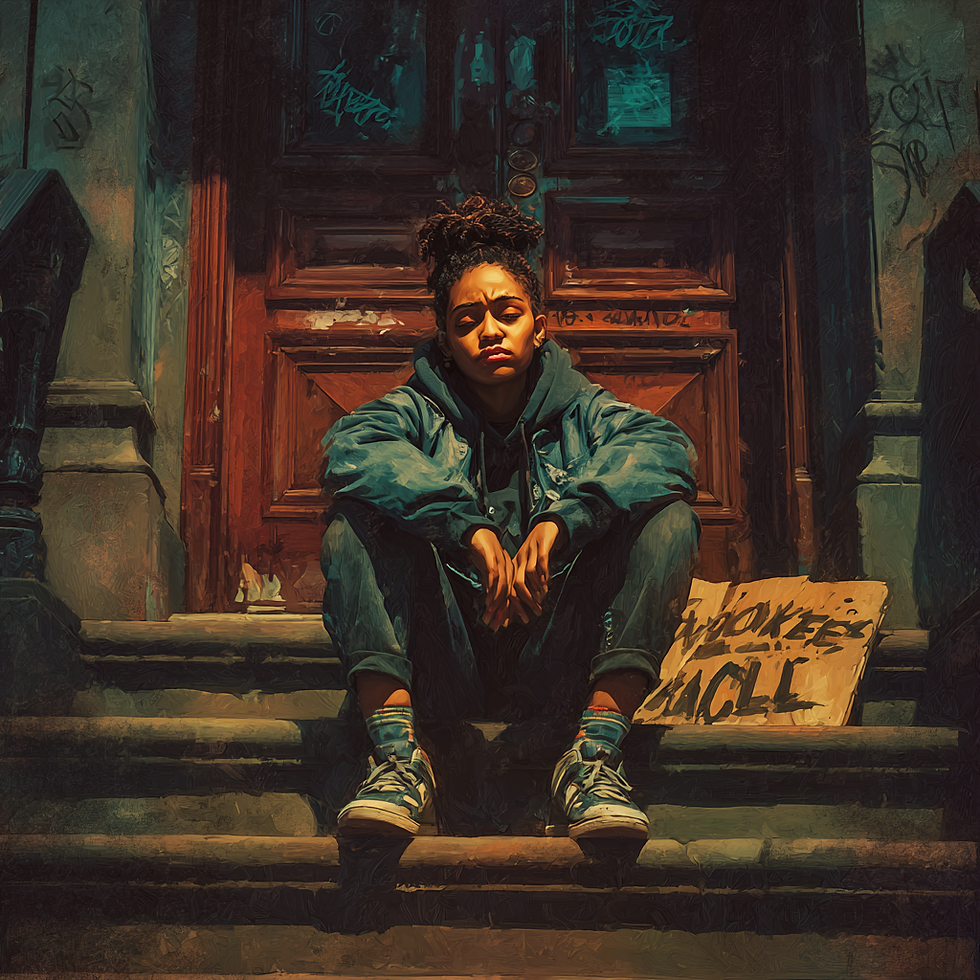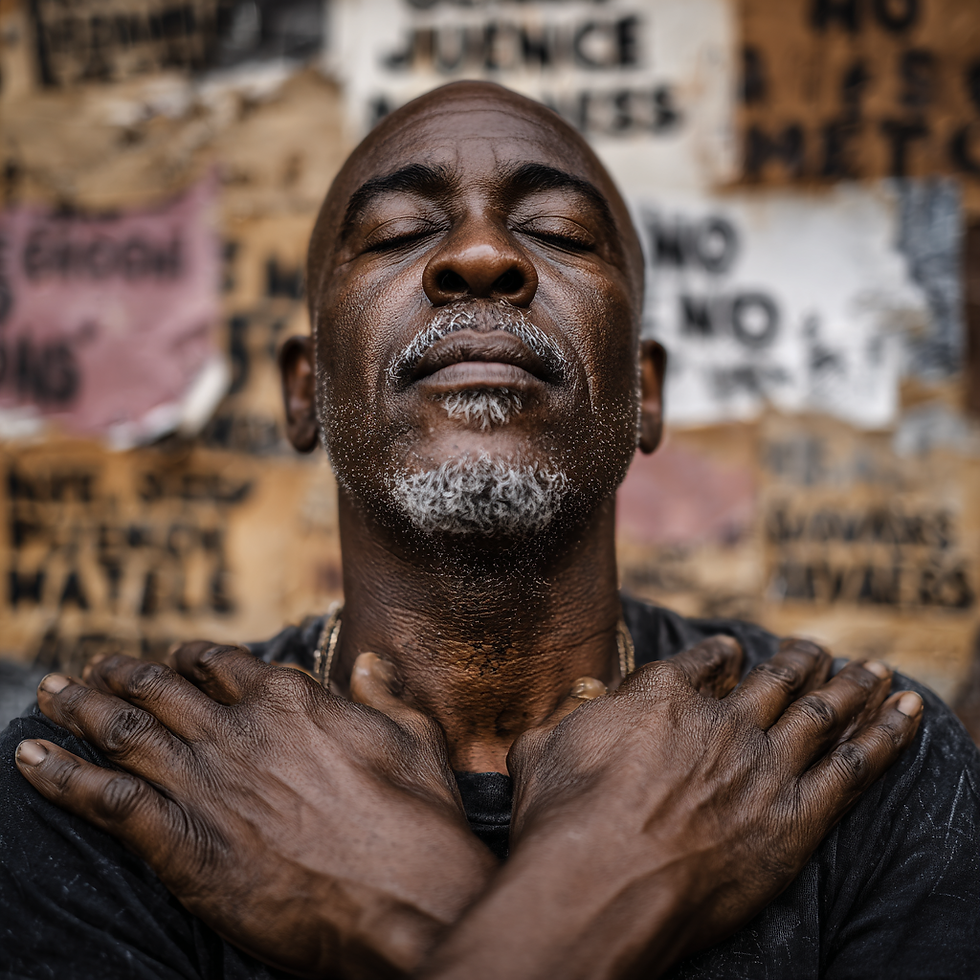Why Black People Ain’t Jumping Up to Protest Anymore
- Keyanna Harper

- Nov 19, 2025
- 4 min read

Let’s do this for real deep, full-bodied, straight from the soul. We’re talking truth: why “No Kings” sounds good out loud, but for Black folks, it ain’t always enough to pull us out the house and back into the street.
Let’s be clear: Black people ain’t scared of the streets. We built the blueprint for protest. If anyone knows about risk, power, and transformation, it’s us. But lately, these movements “No Kings” and all the rest feel like they want Black presence for decoration, not liberation.
TikTok and real talk, you got a young Black woman, sign in hand, trying to talk about injustice, and here come a white lady, pressed about “hurt feelings” because her protest sign called out Israel. Missing the point, right? A sign that should spotlight oppression ends up being policed for someone else’s comfort. That’s not solidarity, that’s censorship. Too many so-called allies center themselves, their own feelings, their own wants, every single time.
Then, you got another protest, same energy, different white face. “So glad you’re here because the last No Kings rally didn’t have any Black folks.” Now, let’s get honest. Black people didn’t show up because when the call was for us in 2020 when police were wilding, when bodies were stacking, when the world was literally on fire for our lives ,who showed up for us? Not enough, not nearly enough.
And when protests pop off for other causes the environment, health care, Palestine, Israel, even democracy itself suddenly, it’s “all hands on deck.” Now it’s urgent because the fallout lands on them. Now the invites are out, so we can help hold the weight. But when did Black pain ever feel urgent for them? When did solidarity really reach us where we live?
That’s why we stay home. That’s why our sneakers are still in the closet. That’s why we scroll instead of march.
Intersectionality Ain’t Just a Word
Let’s talk about intersectionality for real, not the dictionary version. It means recognizing that struggles overlap and connect. If you ain't showing up for Black lives when police break our necks, don’t act brand new when the system you built comes for your neck too.
In these No Kings protests, white folks are just starting to see what it is to be treated bad by power. They want change now ’cause it finally touches them. But intersectionality is more than joining forces when it suits you it’s standing up before it hurts you. It’s fighting for each other like kin, like true community, putting skin in the game before the storm hits home.
Black people we’ve been holding up the intersection for centuries. We’ve carried generations on our backs so others could learn to walk. We don’t do performative unity. If you ignore our suffering, you don’t get our strength.

What Will It Take to Get Us Out Again?
So what’s needed before you see Black folks heavy in the streets again? It’s not hashtags, pretty posters, or another round of “this is the most important moment ever.” It's about a new kind of accountability.
It starts with:
Real Solidarity: We need white folks and non-Black allies to stop with the savior complex, listen deep, and move money, resources, and risk not just words. Stand beside Black protest, not above it.
Consistent Support: Show up for Black issues when nobody’s watching. Don’t post about Breonna Taylor for likes then get quiet when the world moves on. Stay steady, linked, and loud.
Centering Black Voices: Make space for Black leadership in organizing, speaking, and shaping the strategy. Move out the way when it’s time for us to lead. No more telling Black folks how to feel, how to speak, or how to protest.
Risking Privilege: White folks, if you’re not risking something real, you’re not really in it. Paychecks, safety, comfort all on the line. ’Cause that’s what we risk every time.
Healing Work: Don’t just fight power repair where power broke us. That means investing in Black communities, listening to generational hurt, and putting money and action into Black futures, not just Black faces at marches.
Until all that’s in place, don’t get mad when our living rooms are fuller than the city square.

What the News Isn’t Telling You About Protest
Let’s go deeper on the No Kings wave, taking it beyond headlines. CNN’s covering folks calling out government attacks on democracy, bringing up the National Guard, and using big words about rights and justice. It’s cute, but it doesn’t always face the root how movements ignore Black voices unless it’s time for sound bites.
NBC paints the rallies as joyful, colorful, even creative, with celebrities popping off, big numbers quoted, and political speeches. But ask yourself: Do those millions marching today care about the Black votes they throw under the bus? Or the elders who’ve been doing this work before Instagram existed? Most don’t.
POLITICO keeps it polarized: protest versus the GOP, with each side blaming the other. They drag Democrats, call out Republicans, and dramatize the mess. Do they ever mention the broken promises to Black communities? Rarely.
That’s the issue the media covers protest for spectacle. They rarely track the investments, or lack of them, in Black survival after the news cameras are gone.
Speaking Straight to You
So here’s where we stand: Black folks carry history. We do protest right. We know how to move a crowd and never lose the soul. But right now, many of us are tired. Tired of carrying everyone else’s revolution. Tired of being invited to the party but never given a plate. Tired of explaining why our pain matters in movements built on our backs.
Before Black bodies line up at anybody’s protest, there has to be truth, not performance. You want us on the line? Earn it:
Stand up for us before you need us.
Build trust before you ask for unity.
Risk something, not just sign something.
Center our leadership, not just our struggle.
That’s how it goes. Period.
Until then? It’s stay home, love on each other, and heal the wounds y’all keep skipping over.
Black people, never let anybody guilt you into marching for a movement that won’t march for you. Demand respect. Demand realness. And when it’s time to step out, do it on your own terms, for your people, and for justice that actually feels like justice.
That’s how OPC moves. That’s how Black freedom works. And that’s how we stay winning, even when the world is losing its mind.





Comments